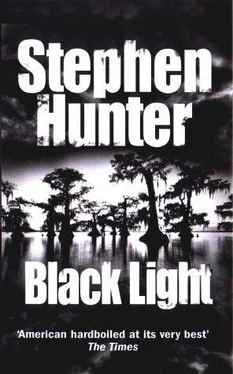Stephen Hunter - Black Light
Здесь есть возможность читать онлайн «Stephen Hunter - Black Light» весь текст электронной книги совершенно бесплатно (целиком полную версию без сокращений). В некоторых случаях можно слушать аудио, скачать через торрент в формате fb2 и присутствует краткое содержание. Год выпуска: 1996, ISBN: 1996, Издательство: Island Books, Жанр: Триллер, на английском языке. Описание произведения, (предисловие) а так же отзывы посетителей доступны на портале библиотеки ЛибКат.
- Название:Black Light
- Автор:
- Издательство:Island Books
- Жанр:
- Год:1996
- ISBN:0-385-48042-3
- Рейтинг книги:3 / 5. Голосов: 1
-
Избранное:Добавить в избранное
- Отзывы:
-
Ваша оценка:
- 60
- 1
- 2
- 3
- 4
- 5
Black Light: краткое содержание, описание и аннотация
Предлагаем к чтению аннотацию, описание, краткое содержание или предисловие (зависит от того, что написал сам автор книги «Black Light»). Если вы не нашли необходимую информацию о книге — напишите в комментариях, мы постараемся отыскать её.
Black Light — читать онлайн бесплатно полную книгу (весь текст) целиком
Ниже представлен текст книги, разбитый по страницам. Система сохранения места последней прочитанной страницы, позволяет с удобством читать онлайн бесплатно книгу «Black Light», без необходимости каждый раз заново искать на чём Вы остановились. Поставьте закладку, и сможете в любой момент перейти на страницу, на которой закончили чтение.
Интервал:
Закладка:
“Polyester is fine. And a cooler. Fair enough?”
“Gotcha.”
He hung up to more silence in the room and the minutes ticked by. At last the phone rang. It was about 3:30. “Hello.”
“Bob?”
It was Sergeant Major Jenks.
“Yes sir.”
“All right, I got some info for you. You guessed right pretty much about the M-3s. At no one time did the army have on its TO&E more than two thousand of those units. They was damned expensive, they was hard to operate and they was delicate, so distribution was mainly to elite units; they never handed ’em out to the troops at the company or platoon level. Hell, you couldn’t even buy one at the PX! Dispersion was mainly to special forces units in Europe, to the big airborne divisions at brigade or regimental S-2 level, to 4th Army in Washington State and the 3rd Mountain Division up in Alaska. The heaviest profusion of them was to 9th and 23rd Infantry on the DMZ at the 38th parallel in Korea. Another complement went to the Jungle Warfare School in Panama. Just what you’d expect.”
Damn , Bob thought.
“Okay, fine, Norman, I—”
“Wait a sec, ain’t done yet. Don’t this beat all? According to our records, three such units were transshipped from the Panama Zone, the Jungle Warfare School, to Camp Chaffee, Arkansas, in late June of 1954.”
Bob waited a second.
“What for?”
“Well, one of the problems with the goddamned things was simple: no doctrine. They were not effectively used in Korea because nobody had thought much about the best methods of deployment and there was thought about junking the things altogether. Then a brilliant young first lieutenant wrote a paper on night-vision tactical doctrine which he submitted to the Infantry Journal , where it got published and he got noticed. So he finds himself TDY Camp Chaffee, where he’s put in charge of what they’re calling the Experimental Night Tactical Development Program, code-named B LACKL IGHT, where they run a lot of night-fire operations trying to figure out the best way to deploy the thing, while also working with ways to refine it. They got some R&D types, they got some intel boys, maybe even some Agency boys in it.”
“It sounds like a black operation. The technology would be useful for a hell of lot more people than company commanders with perimeters to defend.”
“You got that right.”
“Give me a name, Norman.”
“I thought you’d ask for one,” said Jenks. “And I got a hell of a name for you. Preece.”
“Preece!” said Bob.
“Yep. That’s where the whole army night-Sniping program began. With B LACKL IGHTand First Lieutenant, later Major and now Brigadier General James F. Preece, retired. Jack Preece.”
Bob nodded. The name took him way back.
“Tigercat.”
“Tigercat. That’s the one and same guy.”
“You got an address for the general?”
“I went to the computer for you, Bob. You never heard this from me, which is why I am calling from a pay phone in Arlington.”
“Fair enough.”
“He’s now CEO and director of research for an outfit called JFP Technology, Inc., in Oklahoma City.”
“What’s JFP Technology?”
“One of those small unmarked buildings that’s really skunkworks for nasty toys. Their specialty is sound suppressors and night-vision equipment for the world’s armies and SWAT teams. Our Delta guys use their stuff and so do the SEALs. That’s what Tigercat gets you in the civilian world.”
Norman gave him the number.
“Thanks, Norman,” said Bob, then hung up. He waited a second, letting his head clear. Tigercat was the code name for the 7th Division Sniper School in Vietnam, where the army ran its snipers through and taught them the doctrine. Of course there was a problem: army doctrine was different than marine doctrine. Not worse, not better, just different. And it worked, or at least the kills said it did. Army snipers ran up far higher numbers in Vietnam than marines did.
So was it an interservice thing? The fact that there was not a lot of love lost between sniper communities in the two services, either then or now? Maybe. Maybe not. Bob didn’t know. What he did know was that Preece’s Tigercat turned out a number of first-class shooters very quickly; and in no little time, the army snipers were putting bodies in bags all over Nam. Yet even the army was a little awkward about this triumph; its huge and efficient P.R. machine never made a thing of it, no books came out of it, none of its high scorers ever became known to the public as had he and Carl Hitchcock. It was … well, it was different.
The door opened and Russ walked in.
“You want me to unload the truck?”
“Just a minute,” said Bob. “Now you listen to me.” He dialed the number as Russ sat across from him. After a bit the phone was answered by a young woman.
“JFP Technology,” she said.
“Yes, hello, I’m calling for General Preece.”
“May I ask who’s calling?”
“Yes, my name is Gunnery Sergeant Bob Lee Swagger, USMC, retired. I was familiar with the general’s operations in Vietnam; he might be familiar with mine.”
The phone went dead for a bit and then, “Gunnery Sergeant Swagger?”
“Yes sir, it is.”
“By God, as I live and die, the real live Bob the Nailer. I never thought I’d have the pleasure. You did a hell of a job of work in country.”
“Thank you, sir. Just the job the Corps gave me.”
“You may not realize this, but do you remember when you won the Wimbledon Cup in ’71 after your second tour?”
“Yes sir, I do.”
“Well, I came in third!”
“My God!”
“Yes sir. You had it that day, Sergeant. Nothing threw you. Not the wind or the sun or the mirage. You shot through everything.”
“That’s our good Marine Corps training, sir!”
“Sergeant, you don’t ‘sir’ me, all right? I’m retired now. All that’s behind us. What’s on your mind?”
“Well, sir, I’ve signed up to do a damned book. ‘I was there,’ that sort of thing.”
“That’ll be a hell of a book. I can’t wait to read that one. The things I heard about the An Loc Valley.”
“Hell of a fight,” said Bob. “Anyhow: I’m working with a young writer and he’s got me convinced we ought to do what he calls context. You know, background, the big picture, how it all fits together. So I thought I’d have to describe the marine sniper program in those days. And he wanted to look at the whole damned thing. Army sniping too; give it the grand overview, he says. Well, sir, I thought you’d be the man to talk to.”
“Gunny, you know a lot of that is still classified. And the army never went public with its snipers in the way the Corps did. Too damn liberal in Washington, I suppose.”
“Yes sir.”
“Off the record?”
“Hell yes, maybe you could just point us in the right direction.”
“You in town?”
“I’m actually home in Arkansas. Eight hours away maybe. Could drive up tonight.”
“Get here tomorrow morning. Let me see. Hell, I have a meeting with Sales. Oh, fuck, I’ll shift it. Jean, call Sales, tell them we’ll have the meeting tomorrow afternoon!”
“That’s it,” said Bob. The general gave him an address.
“See you tomorrow.”
Bob hung up.
“Let’s go.”
“Now?”
“I ain’t getting any younger.”
Some nights it was good and other nights it was beyond good, into some kind of great. Tonight was great. When he was done and when she had given him the ritual compliments, he rolled over and went downstairs. The huge house on Cliff Drive was more or less quiet except for the shiftings of his sleeping children. The light snapped off and she went to sleep. He poured himself a glass of Jim Beam, walked out on the patio and saw, far below, the winking runway lights of the airfield. He took a sip of the whiskey and enjoyed for just a second the illusion that everything was fine in his empire.
Читать дальшеИнтервал:
Закладка:
Похожие книги на «Black Light»
Представляем Вашему вниманию похожие книги на «Black Light» списком для выбора. Мы отобрали схожую по названию и смыслу литературу в надежде предоставить читателям больше вариантов отыскать новые, интересные, ещё непрочитанные произведения.
Обсуждение, отзывы о книге «Black Light» и просто собственные мнения читателей. Оставьте ваши комментарии, напишите, что Вы думаете о произведении, его смысле или главных героях. Укажите что конкретно понравилось, а что нет, и почему Вы так считаете.












